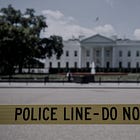Six Signs Something's Happening Behind the Scenes (and Six Signs It's Not)
Update #14 | No one's coming to save us. Or are they?
If you haven’t read the original post,
I highly recommend reading it first ↓
Author’s Note: This post is too long for some email clients. You may have to open it on your browser instead.
Update #14
We’re under attack. What’s our leadership doing about it?
Donald Trump’s 2024 election victory is illegitimate, and it’s pretty obvious.
That much is true whether or not the cyberattack on election infrastructure is ever “forensically” proven (though both I and others have concluded that the results are statistically impossible).
Prior to the election, the U.S. government warned about a widespread Russian influence operation. We saw the disinformation campaign in action. We’ve witnessed the MAGA wing of the Republican party morph into the party of Putin over the past decade. The election itself was beset by numerous methods of voter suppression and interference, including dozens of Russian-linked bomb threats to Democratic-leaning polling districts.
And now, the enemy—the menace of a fascist, corrupt, pro-Russian, white supremacist oligarchy—isn’t just at the gate; it’s inside the walls and is poised to seize control of our nation in just 52 short days.
Unless something is done, Russia has won a decisive victory for all time, without firing a single shot.
If we can see the writing on the wall, surely our democratic elected leadership can, right? After all, they’re backed by 20,000 analysts in the intelligence community, plus the Federal Bureau of Investigation, Department of Justice, and the State Department. They’re supported by the Five Eyes and our NATO allies, none of whom want to see Trump back in the West Wing.
From here, it’s hard to tell.
There are some signs that the Biden Administration, while still controlling the levers of government, may be determinedly engaged in a quiet countercoup to undo the impending apocalyptic impact of Trump’s second term.
Yet there are also signs that Biden, and the Democratic party as a whole, are content with limiting their response to impotent hand wringing and will allow the nation to slip into the abyss without so much as a whimper.
So which is it? We won’t know for sure until we see the overdue downfall of Trump, the arrest of his traitorous ilk, and the dismantling of the machine that enabled him. If that truly is the plan, it must be a closely held secret.
It’s likely that we won’t know until January. In the meantime…
Schrödinger's Democracy
Like Schrödinger’s famous feline thought experiment, American freedom is simultaneously both alive and dead until we observe the outcome. But that doesn’t stop us from drawing conclusions based on what we can see.
Below, I’ll outline the case for both possibilities.
Scenario #1: Dark Brandon Strikes Back
President Joe Biden was born in the midst of the Second World War, as American soldiers fought against the rise of fascism in Europe. He became politically active at the peak of the Cold War. They aren’t such distant of memories for his generation. Of course he’s not blind to the enemy operating within the U.S. today.
After all, he’s a famously crafty politician. In his more than 50 years as an elected official, he’s forgotten more tricks than most in our nation’s capital ever learn. While Biden has strong morals, he’s a believer in bending the rules when it’s needed. And if there’s ever been a time it’s needed, it’s now.
If he’s going to save democracy, Biden needs to act. But we shouldn’t have any fear of that, as his international efforts to outmaneuver Putin and arrange support for Ukraine have been a masterclass in the power of decisive diplomacy. His leadership united the West against Russia’s aggression, coaxed the European Union into strict sanctions and militarization, and added Finland to Sweden to NATO. U.S. intelligence and aid to Ukraine have bolstered the defense of an ally under siege, enabling it to decimate Russia’s military for just 5% of the U.S. military budget.
Should he be half as capable at outfoxing domestic threats, we’re in good hands. Not to mention, he has former prosecutor Vice President Kamala Harris on his team. As she demonstrated in her debate performance, if there’s anyone capable of goading Trump into an action and then striking when the time is right, it’s her.
Here’s six signs that they’re all over it, and are taking steps “behind the scenes” to counter this extreme threat:
1. Harris warned us in her memoir
Harris’ The Truths We Hold was published in 2019, before she announced her 2020 presidential campaign. The memoir details her early life in an immigrant family, her journey to become a prosecutor and district attorney, and her subsequent entry into politics.
In it, she wrote about how dismayed she was that Republican legislators sank a bipartisan bill to improve election security. She specifically highlighted the risk of a Russian cyberattack influencing American elections. The following text is taken from page 236:
And so I am, indeed, kept up at night, knowing the scale of our vulnerabilities and knowing that actions we should be taking immediately have stalled out without any justification.
It’s also important to remember that election systems aren’t the only area in which we are vulnerable to foreign interference.
This is only a small excerpt of a larger passage about the subject, in which she makes a handful of expert-level observations and knowledgeable, concrete suggestions about legislation that would help safeguard the nation’s democratic processes. It seems unthinkable that someone so clearly aware of the danger wouldn’t be on the lookout for this possibility. Surely she expected it was a possibility. And as Vice President, she would be in a unique position to take action about it.
2. Biden, Harris, and other top Democrats have been eerily quiet
For the years leading up to the election, leading Democrats have been vocal about how Trump represents a serious threat to American democracy. In 2021, Sen. Nancy Pelosi (then Speaker of the House) called Trump “a domestic enemy in the White House.” Both Harris and vice presidential candidate Gov. Tim Walz openly called Trump a fascist during her presidential campaign.
Please take ten seconds to share this article and help get the word out!
Donald Trump didn’t just steal the election, he stole America’s future. And it will stay that way unless we do something about it.
But now that Trump seemingly won the election, those same national leaders have fallen silent. While Trump has announced the bulk of his intended cabinet members—each seemingly designed to be the worst pick imaginable—and made various statements that reveal his increasingly autocratic tendencies, his liberal opponents have largely gone incommunicado.
In their stead, various Democratic governors have seized upon the moment to wargame against Trump’s administration.
Why, then, would Biden, Harris, and other top Democrats go quiet? This is when their voices are needed the most. It’s inconceivable that Biden would roll over and capitulate to a fascist dictator threatening to take over the White House. It seems implausible that Harris would spend so much time talking out about the danger of a second Trump presidency, but then limit her public response to his win to a single concession speech.
Perhaps their silence is because they’re not at liberty to discuss an ongoing investigation.
Regarding her concession speech, Harris used the word “fight” 20 times in it. Consider the following words, taken from the transcript:
A fundamental principle of American democracy is that when we lose an election, we accept the results. That principle, as much as any other, distinguishes democracy from monarchy or tyranny. And anyone who seeks the public trust must honor it. At the same time, in our nation, we owe loyalty not to a president or a party, but to the Constitution of the United States, and loyalty to our conscience and to our God. My allegiance to all three is why I am here to say, while I concede this election, I do not concede the fight that fueled this campaign—the fight: the fight for freedom, for opportunity, for fairness, and the dignity of all people. A fight for the ideals at the heart of our nation, the ideals that reflect America at our best. That is a fight I will never give up.
[…]
And the fight for our country is always worth it. It is always worth it. To the young people who are watching, it is okay to feel sad and disappointed. But please know it's going to be okay.
[…]
On the campaign, I would often say when we fight, we win. But here's the thing, here's the thing, sometimes the fight takes a while. That doesn't mean we won't win. That doesn't mean we won't win.
3. Harris’ post-election content on Reach
Shortly after the election, new images were uploaded to the Harris/Walz campaign on the Reach app (for campaign volunteers). The language used suggests determination and actions to come. These are either in super poor taste, or we’re being told that the fight isn’t over.





4. Wray and Majorkas refused to testify before Senate
In a highly unusual and concerning move, FBI Director Christopher Wray and Homeland Security Secretary Alejandro Mayorkas declined to testify publicly at a recently scheduled Senate hearing on national security threats. This decision marks a significant departure from tradition, as it’s the first time in over 15 years that both leaders have refused to appear before the Senate Homeland Security and Governmental Affairs Committee.
The hearing typically allows agency heads to discuss threats to national security. Wray and Mayorkas' refusal to testify in an open setting is seen as a break from standard protocol, and a troubling one at that.
The situation is even more notable considering the political context: Trump has named replacements for both Wray and Mayorkas, with Trump “deep state fighting” loyalist Kash Patel and South Dakota Gov. Kristi Noem, respectively, as their intended successors.
I can’t imagine many national security threats or investigations that would be so precarious that they can’t even be discussed publicly in general terms. But foreign election interference resulting in the installation of an illegitimate president hellbent on destroying the union would be among them.
The Department of Homeland Security (DHS) released a statement saying that they, and the FBI, had offered to speak to the committee in a classified setting. They also emphasized that they had provided “extensive unclassified information about the current threat environment, including the recently published Homeland Threat Assessment.”
Could this be a clue?
There are only three Homeland Threat Assessment (HTA) documents available on the DHS website: for 2020, 2024, and 2025. The 2025 HTA, published in October 2024, dedicates a significant, prominent portion of its content to discussing foreign election interference—even more than 2024’s—which is especially notable considering that 2025 is not a federal election year.
Here’s a relevant passage from the 2025 HTA, published only a month before the election:
Threat Actors Likely To Focus on 2024 Election Cycle
Our electoral processes are an attractive target for threat actors, and we expect many will seek to influence the 2024 election cycle, while some others may seek to access or interfere with election systems. […] Foreign malign influence actors almost certainly will target democratic processes across federal, state, and local governments, aiming to affect U.S. voter preferences, exacerbate social tensions, and undermine confidence in our democratic institutions and processes, including election operations. Separately, foreign state-affiliated cyber actors and cyber criminals almost certainly view network infrastructure that supports U.S. elections as attractive targets. There is no reporting, however, to suggest that foreign adversary targeting of such systems has ever prevented an eligible voter from casting a ballot, compromised the integrity of any ballots cast, or disrupted the ability to tabulate votes or transmit election results in a timely manner.U.S. election infrastructure—including voter registration databases and associated information technology (IT) infrastructure and systems—may be targeted by a broad swath of opportunistic malicious cyber actors. These critical elections components and systems typically hold sensitive personally identifiable information of US persons, much of which may also be publicly or commercially available, that could be used to facilitate follow-on foreign malign influence campaigns or other illicit activity.
With this context, it sure seems like Wray and Mayorkas are hinting that a foreign adversary targeted the 2024 presidential election, but that the FBI and DHS are keeping information about it (understandably) under wraps. The classified briefing is scheduled for December. Maybe that’s when they’ll make the big reveal?
5. NATO moving more directly to counter Russia
Over the past month, NATO has significantly increased its efforts to counter Russian aggression and hybrid warfare tactics in Europe.
The head of Germany’s foreign intelligence service warned that Russia’s acts of sabotage against western targets may prompt NATO to invoke the Article 5 mutual defense clause. This would be a major step toward direct military conflict between NATO nations and Russia.
This warning comes as German leaders raise concerns that a recent DHL cargo plane crash in Lithuania may have been the result of a terrorist attack as part of Russia’s hybrid war.
Biden has also recently authorized Ukraine to use long-range American missiles to strike within Russia’s borders for the first time. England and France joined the U.S. with similar authorizations for their Anglo-French missile equivalent.
Additionally, a sudden rebel offensive in Syria has caught the al-Assad regime and its backers—Iran, Russia, and Hezbollah—by surprise. Geopolitical pressures had refocused all all three nations’ attentions elsewhere, leaving Syria vulnerable. NATO member Turkey took advantage of this opening, resulting in the Syrian rebels it backs taking Aleppo, Syria’s second largest city.
Russian and Syrian jets are intensifying bombing campaigns, but the damage to Syria’s position—and Russia’s local political foothold—has already been done.
U.S. sanctions have also triggered rapid devaluation of the Russian Ruble, sparking economic panic in Russia.
None of these events, alone, would mark a turn in NATO’s stance toward Russia. Taken together, however, they demonstrate the alliance is taking a more aggressive posture.
This comes as NATO member Romania cites Russian interference in its ongoing presidential election. It seems there may be a pattern, here. It may be that NATO is taking the threat of Russian influence operations and hybrid war more seriously, having seen the impact in multiple NATO nations’ elections. It just may be possible that western leaders have a plan.
6. Trump’s vs. Biden’s expression
This one’s simple. On November 13, Biden hosted Trump at the White House and congratulated him on his win. Just look at this photo:
Does Biden look like a guy who’s lost it all, and is about to hand over his nation to this fascist dictator? I don’t think so, Jack. He looks like he’s giddily excited for what’s coming next.
Meanwhile, does Trump looks like someone who seized victory and is confident in his control of the situation? Again no. His body language says he’s subservient and doesn’t want to be there. Doesn’t that surprise you? Since when doesn’t Trump want to gloat? It’s backwards.
Conclusion
Do I think it’s certain that there’s something going on behind the scenes? No. But I do think it’s highly plausible.
This isn’t meant to be an exhaustive list of persuasive arguments supporting the idea. Instead, it’s a basic overview to some of the things that give me hope. I’m sure there’s dozens of other potential signals that the Biden Administration and its allies have tricks up their sleeves, but that doesn’t necessarily mean we’re reading it the right way.
Scenario #2: Biden Seeks Unity Until the End
Like many of those in the Silent Generation, President Biden is known for being optimistic and working within the system to achieve change. He believes in following the rules and upholding norms, because two wrongs don’t make a right.
In this light, it’s conceivable that Biden trusts his fellow civil servants to hold Trump accountable, and is happy to retire from public life.
1. Sure, Harris wrote about voting machine vulnerabilities in her memoir, but…
At the time she wrote The Truths We Hold, Harris was a Senator and was involved in election security legislation. But she’s also been busy, has advocated for many different types of legislation, and there’s no sign of her speaking publicly about election security since then. It doesn’t seem to be among her chief concerns—it’s not listed as part of her platform on the Harris/Walz campaign website, for example.
2. Okay, Harris, Biden, and other Democratic leaders have been quiet, but…
Why wouldn’t they be? They lost. They need to lick their wounds, plan their next moves, and prepare for Trump to take over.
Biden is an old, tired man whose focus is on securing foreign policy wins before giving Trump the reins. Harris and Walz are devastated by the loss and exhausted from their sprint of a campaign. The rest of the Democrats are busy pointing fingers.
Since Trump represents an unprecedented attack on U.S. democracy even if he did win legitimately, they’re assuredly wargaming solutions and methods of Democratic resistance to his anticipated tyranny either way. That doesn’t mean they have the winning hand. It doesn’t mean Trump was caught cheating red-handed. It just means that they have work to do, even if we won’t like the outcome.
3. Harris’ post-election content on Reach?
Yeah, those images on the Reach app seem odd, if the Democrats are effectively just rolling over. But we shouldn’t be expecting them to send their best. These are just parting messages, and nobody cares much to review them since the campaign is over.
4. Wray’s and Majorkas’ refusal to testify is odd, but…
It’s odd that FBI Director Wray and Homeland Security Sec. Mayorkas would skip the Senate hearing. But it’s plausible that their reticence to speak publicly about national security concerns has nothing to do with Russian election interference, and instead comes from something more personal: frustration that they are about to be fired.
At least, that’s what Sen. Josh Hawley suggested on X, formerly known as Twitter. He said that it was a “middle finger to America.”
Maybe he’s right.
5. NATO’s moves are preparing for Trump, but the other way
NATO has made a series of more aggressive moves, but it’s not surprising that there’s a big global political push coinciding with Trump winning reelection. Our NATO allies don’t trust him. Neither does Ukrainian President Volodymyr Zelenskyy.
Rather than putting Ukraine’s fate in Trump’s hands, Ukraine and NATO may be attempting to bring the War in Ukraine to a close before January 20. The flurry of strong rhetoric and activity is just as likely part of that effort.
6. Trump’s vs. Biden’s expression?
Honestly, I can’t explain this one… unless Biden put a whoopie cushion under Trump’s seat and Trump wasn’t amused.
Conclusion
The unpredictability of outcomes is a hallmark of politics, where even the most careful analysis of clues can fail to reveal the future. We simply don’t have enough knowledge to know what’s happening in the shadows.
The same set of indicators can lead to wildly different results depending on context, leaving even the seasoned observers to grapple with ambiguity and the limits of foresight.
Until Trump takes office or the government provides clarity, we remain in uncertainty. In the meantime, American democracy exists in a paradoxical state—alive, and yet also dead.
More soon.
If we don’t take action to defend democracy, we don’t deserve to keep it.
If you have relevant information to contribute, please email: tinfoilmatt@proton.me
Read the next update:
Before Election, N.H. Election Software "Misconfigured" to Connect to Russian Servers
Update #15 | Plus: Biden 2020 cybersecurity lead calls for audits & Spoonamore seeks 'America PAC' check recipients who never signed the petition







